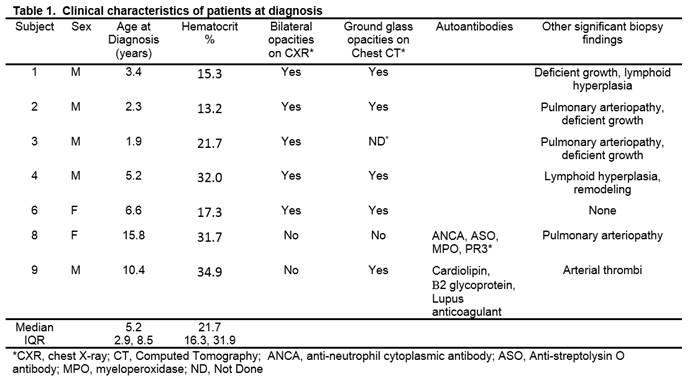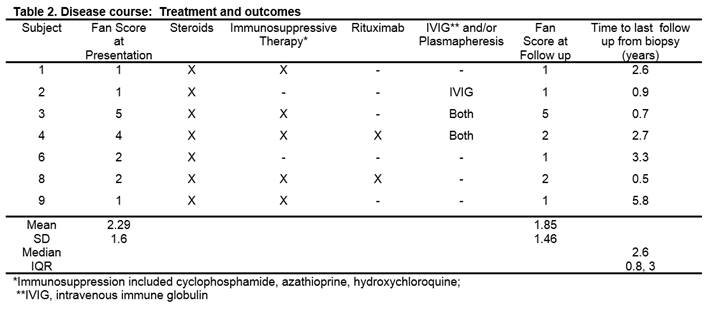Session Information
Date: Monday, November 9, 2015
Session Type: ACR Poster Session B
Session Time: 9:00AM-11:00AM
Background/Purpose: Immune mediated and pauciimmune
pulmonary capillaritis are rare causes of diffuse alveolar hemorrhage and
associated childhood diffuse lung disease. As such ideal therapies and
prognosis are unknown. The purpose was to review the clinical presentation and
outcome in children with pulmonary capillaritis through a single institution
review.
Methods: Retrospective review of children with
biopsy proven pulmonary capillaritis at our institution between 1995-2015 was
performed with case ascertainment through the pathology database and clinical
billing queries. A modified Fan Survival-of-Illness score was calculated to
measure risk of severe morbidity or death (Calculation measured 0-6; >3
indicates increased risk for severe morbidity/death from disease).
Results: Of 74 biopsies reviewed, 7 cases of alveolar
hemorrhage with capillaritis were identified. Median hematocrit at
presentation was 21.7; interquartile range (IQR) of 16.3 and 31.9. Five subjects
presented with respiratory symptoms; the other two presented with pallor and/or
lethargy. Median age at presentation was 5.2 years (IQR 2.3, 8.2) while median
age at follow up was 7.8 years (IQR 4.7,13). The median time between
presentation and diagnosis was 0.08 years (0.08, 0.33). The Fan score decreased
over the course of treatment in only two subjects. Five of the patients had
bilateral opacities detected on chest roenterogram. Five of 6 subjects evaluated
by chest computed tomography had ground glass opacities. Only 2 subjects had autoantibodies,
leading to diagnoses of microscopic polyangiitis and antiphospholipid antibody
syndrome. Five subjects were diagnosed with pauciimmune pulmonary
capillaritis. All subjects received systemic steroids. Those with the most severe
Fan scores (>3) received escalated therapy regardless of autoantibodies.
Two subjects have had multiple relapses requiring hospitalization. Morbidities
included restrictive lung disease, cataracts, pulmonary hypertension, sleep
disturbance and exercise intolerance. At 0.5-5.8 years of follow up,
transplant free survival was 100%.
Conclusion: Unlike other vasculitides, pulmonary
capillaritis affected prepubescent males disproportionately. Patients presenting
with more severe disease despite absence of disease-associated autoantibodies
received escalated therapies including plasmapheresis with improvement. Normal
hematocrit at presentation did not preclude the diagnosis of pulmonary
capillaritis. Morbidity was moderate with risk of relapse in a subset of
patients. Mortality risk appears favorable.
To cite this abstract in AMA style:
Soares J, Deutsch G, Kinghorn B, Stevens AM. Pauciimmune and Immune Mediated Pulmonary Capillaritis in Children [abstract]. Arthritis Rheumatol. 2015; 67 (suppl 10). https://acrabstracts.org/abstract/pauciimmune-and-immune-mediated-pulmonary-capillaritis-in-children/. Accessed .« Back to 2015 ACR/ARHP Annual Meeting
ACR Meeting Abstracts - https://acrabstracts.org/abstract/pauciimmune-and-immune-mediated-pulmonary-capillaritis-in-children/


